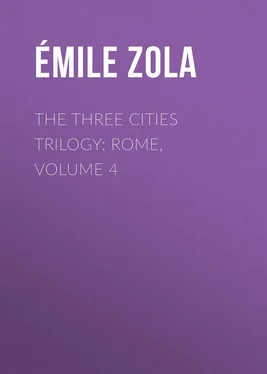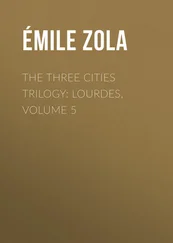Émile Zola - The Three Cities Trilogy - Rome, Volume 4
Здесь есть возможность читать онлайн «Émile Zola - The Three Cities Trilogy - Rome, Volume 4» — ознакомительный отрывок электронной книги совершенно бесплатно, а после прочтения отрывка купить полную версию. В некоторых случаях можно слушать аудио, скачать через торрент в формате fb2 и присутствует краткое содержание. Жанр: literature_19, foreign_antique, foreign_prose, на английском языке. Описание произведения, (предисловие) а так же отзывы посетителей доступны на портале библиотеки ЛибКат.
- Название:The Three Cities Trilogy: Rome, Volume 4
- Автор:
- Жанр:
- Год:неизвестен
- ISBN:нет данных
- Рейтинг книги:3 / 5. Голосов: 1
-
Избранное:Добавить в избранное
- Отзывы:
-
Ваша оценка:
- 60
- 1
- 2
- 3
- 4
- 5
The Three Cities Trilogy: Rome, Volume 4: краткое содержание, описание и аннотация
Предлагаем к чтению аннотацию, описание, краткое содержание или предисловие (зависит от того, что написал сам автор книги «The Three Cities Trilogy: Rome, Volume 4»). Если вы не нашли необходимую информацию о книге — напишите в комментариях, мы постараемся отыскать её.
The Three Cities Trilogy: Rome, Volume 4 — читать онлайн ознакомительный отрывок
Ниже представлен текст книги, разбитый по страницам. Система сохранения места последней прочитанной страницы, позволяет с удобством читать онлайн бесплатно книгу «The Three Cities Trilogy: Rome, Volume 4», без необходимости каждый раз заново искать на чём Вы остановились. Поставьте закладку, и сможете в любой момент перейти на страницу, на которой закончили чтение.
Интервал:
Закладка:
Pierre listened with dolorous astonishment in his heart. Since he had been at Rome and had seen the Fathers of the Grotto saluted and feared there, holding an authoritative position, thanks to the large alms which they contributed to the Peter's Pence, he had felt that they were behind the proceedings instituted against him, and realised that he would have to pay for a certain page of his book in which he had called attention to an iniquitous displacement of fortune at Lourdes, a frightful spectacle which made one doubt the very existence of the Divinity, a continual cause of battle and conflict which would disappear in the truly Christian society of to-morrow. And he could also now understand that his delight at the loss of the temporal power must have caused a scandal, and especially that the unfortunate expression "a new religion" had alone been sufficient to arm /delatores/ against him. But that which amazed and grieved him was to learn that Cardinal Bergerot's letter was looked upon as a crime, and that his (Pierre's) book was denounced and condemned in order that adversaries who dared not attack the venerable pastor face to face might, deal him a cowardly blow from behind. The thought of afflicting that saintly man, of serving as the implement to strike him in his ardent charity, cruelly grieved Pierre. And how bitter and disheartening it was to find the most hideous questions of pride and money, ambition and appetite, running riot with the most ferocious egotism, beneath the quarrels of those leaders of the Church who ought only to have contended together in love for the poor!
And then Pierre's mind revolted against that supremely odious and idiotic Index. He now understood how it worked, from the arrival of the denunciations to the public posting of the titles of the condemned works. He had just seen the Secretary of the Congregation, Father Dangelis, to whom the denunciations came, and who then investigated the affair, collecting all documents and information concerning it with the passion of a cultivated authoritarian monk, who dreamt of ruling minds and consciences as in the heroic days of the Inquisition. Then, too, Pierre had visited one of the consultive prelates, Monsignor Fornaro, who was so ambitious and affable, and so subtle a theologian that he would have discovered attacks against the faith in a treatise on algebra, had his interests required it. Next there were the infrequent meetings of the cardinals, who at long intervals voted for the interdiction of some hostile book, deeply regretting that they could not suppress them all; and finally came the Pope, approving and signing the decrees, which was a mere formality, for were not all books guilty? But what an extraordinary wretched Bastille of the past was that aged Index, that senile institution now sunk into second childhood. One realised that it must have been a formidable power when books were rare and the Church had tribunals of blood and fire to enforce her edicts. But books had so greatly multiplied, the written, printed thoughts of mankind had swollen into such a deep broad river, that they had swept all opposition away, and now the Index was swamped and reduced to powerlessness, compelled more and more to limit its field of action, to confine itself to the examination of the writings of ecclesiastics, and even in this respect it was becoming corrupt, fouled by the worst passions and changed into an instrument of intrigue, hatred, and vengeance. Ah! that confession of decay, of paralysis which grew more and more complete amidst the scornful indifference of the nations. To think that Catholicism, the once glorious agent of civilisation, had come to such a pass that it cast books into hell-fire by the heap; and what books they were, almost the entire literature, history, philosophy, and science of the past and the present! Few works, indeed, are published nowadays that would not fall under the ban of the Church. If she seems to close her eyes, it is in order to avoid the impossible task of hunting out and destroying everything. Yet she stubbornly insists on retaining a semblance of sovereign authority over human intelligence, just as some very aged queen, dispossessed of her states and henceforth without judges or executioners, might continue to deliver vain sentences to which only an infinitesimal minority would pay heed. But imagine the Church momentarily victorious, miraculously mastering the modern world, and ask yourself what she, with her tribunals to condemn and her gendarmes to enforce, would do with human thought. Imagine a strict application of the Index regulations: no printer able to put anything whatever to press without the approval of his bishop, and even then every book laid before the Congregation, the past expunged, the present throttled, subjected to an intellectual Reign of Terror! Would not the closing of every library perforce ensue, would not the long heritage of written thought be cast into prison, would not the future be barred, would not all progress, all conquest of knowledge, be totally arrested? Rome herself is nowadays a terrible example of such a disastrous experiment – Rome with her congealed soil, her dead sap, killed by centuries of papal government, Rome which has become so barren that not a man, not a work has sprung from her midst even after five and twenty years of awakening and liberty! And who would accept such a state of things, not among people of revolutionary mind, but among those of religious mind that might possess any culture and breadth of view? Plainly enough it was all mere childishness and absurdity.
Deep silence reigned, and Pierre, quite upset by his reflections, made a gesture of despair whilst glancing at Don Vigilio, who sat speechless in front of him. For a moment longer, amidst the death-like quiescence of that old sleeping mansion, both continued silent, seated face to face in the closed chamber which the lamp illumined with a peaceful glow. But at last Don Vigilio leant forward, his eyes sparkling, and with a feverish shiver murmured: "It is they, you know, always they, at the bottom of everything."
Pierre, who did not understand, felt astonished, indeed somewhat anxious at such a strange remark coming without any apparent transition. "Who are /they/?" he asked.
"The Jesuits!"
In this reply the little, withered, yellow priest had set all the concentrated rage of his exploding passion. Ah! so much the worse if he had perpetrated a fresh act of folly. The cat was out of the bag at last! Nevertheless, he cast a final suspicious glance around the walls. And then he relieved his mind at length, with a flow of words which gushed forth the more irresistibly since he had so long held them in check. "Ah! the Jesuits, the Jesuits! You fancy that you know them, but you haven't even an idea of their abominable actions and incalculable power. They it is whom one always comes upon, everywhere, in every circumstance. Remember /that/ whenever you fail to understand anything, if you wish to understand it. Whenever grief or trouble comes upon you, whenever you suffer, whenever you weep, say to yourself at once: 'It is they; they are there!' Why, for all I know, there may be one of them under that bed, inside that cupboard. Ah! the Jesuits, the Jesuits! They have devoured me, they are devouring me still, they will leave nothing of me at last, neither flesh nor bone."
Then, in a halting voice, he related the story of his life, beginning with his youth, which had opened so hopefully. He belonged to the petty provincial nobility, and had been dowered with a fairly large income, besides a keen, supple intelligence, which looked smilingly towards the future. Nowadays, he would assuredly have been a prelate, on the road to high dignities, but he had been foolish enough to speak ill of the Jesuits and to thwart them in two or three circumstances. And from that moment, if he were to be believed, they had caused every imaginable misfortune to rain upon him: his father and mother had died, his banker had robbed him and fled, good positions had escaped him at the very moment when he was about to occupy them, the most awful misadventures had pursued him amidst the duties of his ministry to such a point indeed, that he had narrowly escaped interdiction. It was only since Cardinal Boccanera, compassionating his bad luck, had taken him into his house and attached him to his person, that he had enjoyed a little repose. "Here I have a refuge, an asylum," he continued. "They execrate his Eminence, who has never been on their side, but they haven't yet dared to attack him or his servants. Oh! I have no illusions, they will end by catching me again, all the same. Perhaps they will even hear of our conversation this evening, and make me pay dearly for it; for I do wrong to speak, I speak in spite of myself. They have stolen all my happiness, and brought all possible misfortune on me, everything that was possible, everything – you hear me!"
Читать дальшеИнтервал:
Закладка:
Похожие книги на «The Three Cities Trilogy: Rome, Volume 4»
Представляем Вашему вниманию похожие книги на «The Three Cities Trilogy: Rome, Volume 4» списком для выбора. Мы отобрали схожую по названию и смыслу литературу в надежде предоставить читателям больше вариантов отыскать новые, интересные, ещё непрочитанные произведения.
Обсуждение, отзывы о книге «The Three Cities Trilogy: Rome, Volume 4» и просто собственные мнения читателей. Оставьте ваши комментарии, напишите, что Вы думаете о произведении, его смысле или главных героях. Укажите что конкретно понравилось, а что нет, и почему Вы так считаете.












